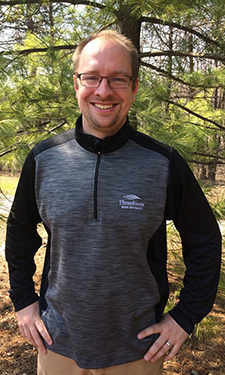 As a child growing up on a ginseng farm in Elroy, Wisconsin, Alex McKinney had an affection for the ocean and dreamed of being a pearl farmer. (Fun fact: Wisconsin accounts for 90 percent of the ginseng grown in the United States and shipped to China.) But, McKinney also had a passion for health and wellness and the outdoors, and when he enrolled at the University of Wisconsin — LaCrosse, he found a major and an opportunity to be involved in, and learn about, public lands and the benefits they provide to people. At the beginning of this year, McKinney was part of a delegation of professionals from the public, private and university sectors that traveled to China to share insights about getting kids involved in winter recreation. Parks & Recreation magazine had a chance to catch up with McKinney to learn about his trip and the success he’s achieved so far in this field to which he was drawn.
As a child growing up on a ginseng farm in Elroy, Wisconsin, Alex McKinney had an affection for the ocean and dreamed of being a pearl farmer. (Fun fact: Wisconsin accounts for 90 percent of the ginseng grown in the United States and shipped to China.) But, McKinney also had a passion for health and wellness and the outdoors, and when he enrolled at the University of Wisconsin — LaCrosse, he found a major and an opportunity to be involved in, and learn about, public lands and the benefits they provide to people. At the beginning of this year, McKinney was part of a delegation of professionals from the public, private and university sectors that traveled to China to share insights about getting kids involved in winter recreation. Parks & Recreation magazine had a chance to catch up with McKinney to learn about his trip and the success he’s achieved so far in this field to which he was drawn.
Parks & Recreation magazine:Of what accomplishment are you most proud?
Alex McKinney: We have this really unique adventure adaptive program we started about 10 years ago, where we partner with local companies and other organizations to provide outdoor adaptive opportunities. Three Rivers Park District provides participants with kayaks adapted with outriggers so if people don’t have feeling in the lower half of their body, they can still go out and paddle and not have to worry about tipping over. We also provide custom paddles for participants with grip issues, or for certain amputees, we have paddle supports. We received a grant from NRPA to get adaptive mountain bikes, and our maintenance crews adjusted a portion of our single-track trails to make them accessible for the bikes. Our adaptive programs are really growing, and we’ve hired some great instructors who helped get it off the ground. Now, we have Nordic sit skiing, kayaking, mountain biking, archery, fishing and a variety of other opportunities for individuals to experience the outdoors.
P&R:What is one of the biggest challenges you’ve encountered in your career?
McKinney: A constant challenge is finding a balance, filling a niche and making sure we’re staying relevant to what we’re doing. That comes down to figuring out what our core values are and staying true to those core values. We are a very successful division, and we work for a fantastic park district which has seen a lot of success as well. Our core really is to introduce outdoor active lifestyles to new people and expose them to our parks and to show environmental stewardship and the benefit of recreation and our natural resources. If we can’t relate it back to that, then we really have to ask ourselves, ‘What’s the reasoning for doing this?’
P&R:Tell us a bit about your trip to China at the beginning of this year.
McKinney: I teach in the Recreation, Parks and Leisure Studies Division at the University of Minnesota, which has a global component to what it does. About five years ago, the university developed an American/Chinese culture exchange which has a different focus each year; this year was on winter recreation. I was asked to go over there as part of a delegation to talk about how we engage kids and what are our models for success. The couple big reasons China is so focused on this now is that the country is experiencing a massive influx into its middle class — about 2-3 percent of the population (roughly 20-30 million people) a year — and this is leading to a more sedentary lifestyle. We spent a lot of time in Northern China and when you think of China you think of bikes — we didn’t see many bikes. With the increase in income, cars were everywhere, so the government is focusing on the people’s health. Also, China will also be hosting the winter Olympics in 2022, so as part of that they have this goal of getting as many people as possible into winter sports and recreation.
Sonia Myrick, Managing Editor of Parks & Recreation magazine

